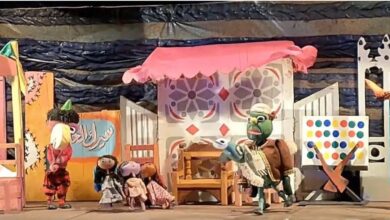Mona Amer appears in a new Ramadan cooking show, inspiring the homebound chefs of the city just in time for iftar
It’s early evening and Mona Amer has just finished another successful iftar for her family. Content and glowing, she sits down with Al-Masry Al-Youm for a chat about her media plans, her inspirations and why doing what you love is a blessing. Amer’s show runs at 3:30pm on local channel 2 throughout Ramadan.
Q: How did you first become interested in cooking?
A: I was very curious about cooking as a child. Although my mother would throw us out of the kitchen come cooking time, I was the one who would sneak back in to watch and learn. It took a while to understand though. I remember one of my first kitchen related disasters happened at Sham El Nessim (Egyptian Easter) when I snuck in the kitchen to find a plate of fesikh (salted herring). The smell was so pungent that I decided the next step in the process would be to clean the fish — so I proceeded to wash the fesikh, ultimately ruining it. But as time went on, my mistakes became a little more forgivable — like tossing a chicken in to boil without trussing it first. This was a serving faux pas, despite the potential tastiness of the chicken itself.
Cooking is first and foremost my hobby. I remember living in Libya and getting German Burda recipes, mainly desserts. I would head out to what they called the "Superior Market" to search for ingredients. I don’t think I will ever see a store like that again — not only was it stocked with all the latest American ingredients, but it was staffed with people who would literally follow you around and help you find all the ingredients you needed. It was such a pleasure to try new ingredients and spices; to discover new combinations through the items available there.
Q: What is a typical day like for you in Ramadan?
A: The beginning of Ramadan is the most hectic for me. I was shooting my Ramadan Akla Beyti show, so mornings would be taken up with that. By mid-afternoon I would have to come back home and start cooking iftar for my family. They’re not particularly demanding, but I take my cooking seriously. After iftar, I would spend the evening preparing for the following day’s shooting and try to get some sleep before waking up early to shoot again.
Q: Do you let anyone help you in the kitchen?
A: Not really. I draw the line at onion and garlic chopping. I like to chop my own vegetables and meat and set up my own ingredients. It bothers me when things are not prepared with the same care I put into all my cooking.
Q: What is better, the cooking or the eating?
A: Honestly, the cooking. There’s something about putting a good meal together. I feel like an artist with a painting or a sculpture… and to have the work I do enjoyed. I’d have to say I revel more in the cooking process. I have this knack for understanding how something is going to taste by just imagining the spices I’m going to add to it — like a sense of smell that guides my cooking from beginning to end.
Q: What are your favorite recipes?
A: I’m not sure if I can really choose favorites or specialties. Not only do I dabble with dishes from all over the world, I often change my dishes just a little based on my mood or the occasion. It’s almost like making the dish anew each time. These days I’m very into fusion — mixing the basic dishes I have cooked for so many years. I like to mix up spices and flavors and bring together new combinations and create new dishes.
Q: What are the necessities in any menu? Appetizers, soups, etc?
A: I’ve come to find that one of the most important things to any meal is the liquid. The juices and soups are just as important as the food. They have to be well chosen and well made in order to create the perfect meal. Appetizers and fillers are not as important. I often sit down with my family for a light iftar of pasta.
Q: Why did you stop your regular cooking show?
A: It’s often a hard decision for anyone working with media exposure to find the right balance. I started this cooking show trend and with the number of people who have made shows similar to mine, I find it’s better to take a step back and perhaps a step in a different direction. After stopping my regular show, I found that people were waiting for the Ramadan cooking show. The anticipation and the theme behind the show gave it momentum. I am enjoying Akla Beyti so much. I try to make it easy and enjoyable by using ingredients that are easy to find and even try recipes I’ve never done before. While there is a strong Egyptian theme, I try to feature international dishes every once in a while and share creative cooking ideas with my audience.
Q: Do you feel any animosity from male chefs?
A: Not in the least. I think they find me somewhat of an anomaly but I am always on good terms with the typical male chef. We share ideas and have mutual respect for one another. In restaurants, the chefs are often very attentive and concerned about my assessment of the meal I’m enjoying. It’s actually very flattering.
Q: Do you see cooking as "a woman’s job"?
A: Not at all. Cooking is a talent that anyone can be born with — men or women. In our increasingly modern world it is becoming more acceptable for men to cook at home and I think this is great. If you love to cook and are good at it, there’s no reason you shouldn’t be cooking!
Q: Do you bake as well?
A: Definitely. At the end of every Ramadan I have to make kahk, in my own oven — although in recent years the amount of kahk I make has lessened significantly because it is very heavy. I’ve always stuck with my grandmother’s kahk recipe, which calls for ingredients such as samna (ghee) from Upper Egypt.
Q: What recipe will you share with us today?
A: The original Anatolian Circassian Chicken. Most Egyptian dishes that contain protein come from Turkey. In fact, rice pudding itself was a dish the Turks used to make for royalty. After they invaded Egypt and brought their recipes, the Egyptians adopted them and made them their own. This is why rice pudding is so often served on special occasions.
Circassian Chicken
1 chicken, cleaned out or ¾ kg chicken breasts
6 cups of water
1 onion
1 tsp cardamom
1 tsp mistika
Salt and pepper to taste
Boil the chicken in the water with the spices. The chicken must be boiled so it can be hand-shredded for this dish. If you are using a whole chicken, put it in cold water with the spices and bring the pot to a boil, then lower the flame until it is cooked. This may be about an hour for a whole chicken, depending on its weight. If you have a meat thermometer, the chicken is done when it reaches 180 degrees. Another telltale sign is if the drumstick is easily detached from the chicken. For chicken breasts, 30-40 minutes of simmering will do.
Remove chicken from stock and reserve stock.
Rice
2 cups of medium, round grain white rice
4 cups of reserved chicken stock
Put 4 cups of reserved chicken stock in a pot and let it boil. Toss in 2 cups of rice and turn the heat to low until the water is absorbed (about 20 minutes). The rice should be a little soggy.
Sauce
1½ cup walnuts
¾ cup stale white toast with crust removed
1 cup milk
5 cloves garlic
1 tsp dried coriander
A pinch of nutmeg
1 tsp butter
Grind walnuts and soak the stale bread in the milk. Grind the garlic and spices, add the walnuts, add the milk and bread, and then put everything in a food processor until it becomes a paste. Take the paste out and fry it in a spoon of butter for just a few minutes, until you can smell the garlic but not until it is brown.
Add a cup of stock to the paste and let it boil for a few minutes until it becomes a creamy sauce.
Add in the shredded chicken and let the mixture boil for 2-3 minutes.
Serving
Spoon rice onto a plate, creating a nice mound.
Pour chicken in sauce over the rice.




